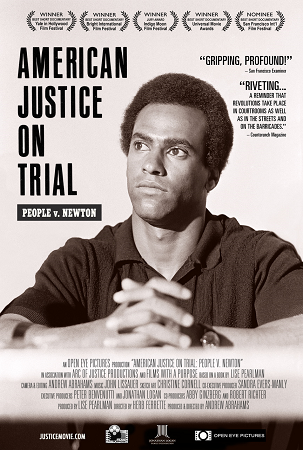
American Justice on Trial: People v. Newton 2022
Distributed by Good Docs
Produced by Lise Pearlman and Andrew Abrahams
Directed by Andrew Abrahams and Herb Ferrette
Streaming, 40 mins
College
Civil Rights; Law; Race Relations
Date Entered: 07/05/2023
Reviewed by Russell A. Hall, Reference and Instruction Librarian, Penn State ErieHuey P. Newton co-founded the Black Panther Party for Self-Defense (Black Panthers) in 1966 in Oakland, California. The Black Panthers, a left-wing political group, gained fame and notoriety for their uncompromising opposition to police brutality against African-Americans, including the use of violence for self-defense. The organization did a great deal of grass roots social work, but mainstream American knew them from images of them brandishing weapons in public. In an era of great social upheaval, rife with urban riots, an unpopular war, and political assassinations, the radicalism and militancy of the Black Panthers made them a threat to Middle America. Unsurprisingly then, it was national news when Huey Newton was arrested in 1967 for allegedly murdering a police officer. It was a shock however, when Newton selected a white attorney, Charles Garry, to represent him. Garry’s aggressive and unconventional approach to voir dire resulted in a jury that was incredibly diverse for its time, consisting of a majority of women, and one African-American man who was elected foreman. This revolutionary approach to jury selection worked to move (albeit slowly) toward having juries with more diverse members (though this process is still imperfect). Newton’s conviction for manslaughter, overturned on appeal in 1970, was yet another shock from this trial in that it showed that an African-American man, especially one of Huey Newton’s prominence, who was involved in the murder of a police officer would not, as a matter of course, get the death penalty.
American Justice on Trial: People v. Newton recounts the story of Newton’s first trial for the death of police officer John Frey. The film demonstrates the impact this trial had on criminal law in the United States. The story of the trial is largely told through interviews with people who were involved in the trial or with the Black Panthers. These interviews are supplemented with archival photos and videos that do a particularly good of demonstrating the situation in Oakland before and during the trial. Most interestingly though, the film does a tremendous job of using courtroom-sketch style drawings and exceptionally talented voice actors to show the scenes that were not privy to cameras and allowed those who were not alive to still have a voice (seemingly through the use of court records). This choice was particularly powerful when the actor read Huey Newton’s words, especially concerning the problem of justice for African-Americans in the U.S. system. The film would have benefited by employing interview materials from academics who could lay in more context around the trial and society at that time. At 40 minutes in length, the film should be able to be screened in the classroom and still allow for some discussion.
American Justice on Trial: People v. Newton is recommended for courses that examine race and law in the 20th century United States (with reverberations into the 21st century) or the history of Civil Rights in the United States.
Awards:Best Documentary Short, Shortlist, 95th Academy Awards; Best Short Documentary, Pan African Film Festival; Best Short Documentary, Yale in Hollywood Film Festival; Best Short Documentary, Bright International Film Festival; Best Short Documentary, Doc.London Documentary Film Festival; Best Short Documentary, Universal Movie Awards; Best Documentary, Black Film Festival of New Orleans; Best Documentary, Athens International Monthly Film Festival; Best Short Film, Ashoka International Film Festival; Best Short Film Director, Ashoka International Film Festival; Jury Award, Indigo Moon Film Festival; Diaspora Special Recognition Award, DjarFogo International Film Festival; Outstanding Achievement Award, Cult Critic Movies Awards
Published and licensed under the Creative Commons Attribution 4.0 license. Anyone can use these reviews, so long as they comply with the terms of the license.